The Army has launched a new program to find small businesses with concepts to increase the rate of fire for its self-propelled howitzers, including the future Extended Range Cannon Artillery (ERCA).
The program aims to have companies on contract 30 days after the submission period closes on October 6, including initial deals worth up to $200,000 for four months of work and “considerable increases for Phase II and beyond.”

“This rate of fire aspect is more than just putting rounds in the back of the howitzers,” Brig. Gen. John Rafferty, director of the Long-Range Precision Fires Cross Functional Team, said in a statement on Tuesday. “It’s also about asking, ‘where do we spend all of our time?’ We spend a lot of our time handling unpacking, unloading and downloading ammunition. If we can do that more efficiently we will become a more combat effective unit.”
Rafferty said earlier this week that getting after an improved rate of fire is a key next step for the ERCA program, which is intended to allow an upgraded version of the M109A7 howitzer to reach ranges of more than 70 kilometers (Defense Daily, August 24).
The Army is working on its own design for an ERCA autoloader, while Rafferty has reiterated that the service is seeking industry and non-traditional partners to offer concepts that can “increase the rate of fire in an alternate way.”
The new Special Program Awards for Required Technology Needs (SPARTN) aims to make it easier for smaller technology firms to work with the Army on modernization programs, with an opportunity to turn innovative solutions into longer-term business cases.
“The aim is for those commercial solvers to create systems or subsystems that not only solve Fire Faster, but also become sources of long-term commercial revenue,” the Army wrote in a statement. “The program addresses the three long-standing barriers small businesses have faced in working with the Army: transparency, access, and capital.”
Rafferty noted that the SPARTN program follows a successful Army Applications Lab’s (AAL) cohort program which brought in non-traditional partners to work on autonomous resupply concept.
“The Army usually gives a piece of paper that says, ‘go build this,’” Rafferty said. “[The Field Artillery Autonomous Resupply cohort run by AAL earlier this year] was the first time we provided companies a chance to explore the problem and immerse themselves into the problem. We had iterations with subject matter experts for meaningful exchanges, so rather than someone just checking to make sure they’re making progress on a contractual obligation, there was this opportunity to immerse themselves with this community on a routine basis to bounce ideas off of and to get feedback. It has proven to be an effective process.”
Applications for the SPARTN program will be accepted from September 18 through October 6.